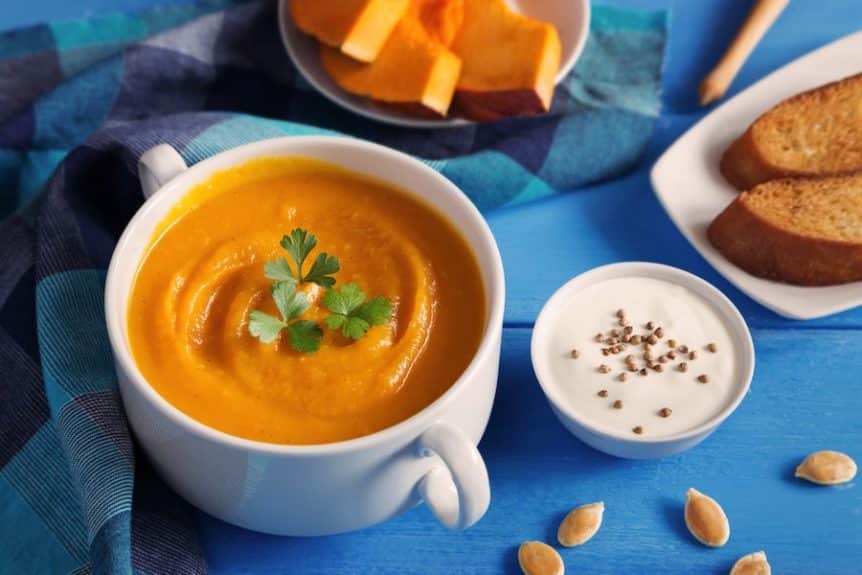
by Lisa Shettle, MS, RDN, CD-N
Food is fantastic during the fall season! The smells of the season make all of us crave a cozy meal or drink like a warm pumpkin spiced latte. But, pumpkin spice isn’t the only thing that’s nice this time of year! From apples to sweet potatoes, there are so many wonderful flavors to try.
These different foods are loaded with vitamins, minerals, and other healthy plant elements. There are many nutrients that overlap amongst the different produce items, but there are also many differences. Aiming for a variety of foods will provide a variety of flavors and nutrients.
- Apples – 1 medium apple provides 95 calories, 4.3g fiber (16 percent of the daily value) and 8.4mg vitamin C (11 percent of the daily value). Some of the phytonutrients in apples have been shown to help control of blood sugar. Add diced apples to salad, combine chopped apples with cabbage, slice apples with cheese or peanut butter, bake or microwave sliced apples with cinnamon and honey.
- Brussels sprouts – 1 cup of brussels sprouts provides 56 calories, 4.6g fiber (15 percent of daily value), an excellent source of vitamin C & K (>100 percent daily value), very good source of folate, B6, manganese, choline, copper, B1, phosphorus, omega 3 fats, potassium (11-25 percent of daily value), good source of iron, B2, B5, magnesium, vitamin A, B3, calcium, zinc (5-10 percent of daily value). Contains a high amount of the phytonutrient glucosinolate which is cancer protective. Roast with olive oil salt and pepper, shred and combine with red onions, walnuts, goat cheese for a delicious salad, shred and sauté with lemon juice olive oil and seasoning.
- Cauliflower – 1 cup of cauliflower provides 30 calories, 2.6 gms fiber (10 percent daily value) and is an excellent source of vitamin C, K, folate, B5, B6, a very good source of choline, omega-3 fats, manganese, phosphorus, biotin, and a good source of b2, b1, potassium, B3 and magnesium. Eat raw with hummus, puree into a soup, use as a “pizza crust”, use in place of rice, add to stir fry, combine with pumpkin seeds and walnuts and serve cold as a salad.
- Sweet potato – 1 cup of sweet potato provides 180 calories, 6.6g fiber (24 percent daily value – this helps control blood sugar!), an excellent source of vitamin A, very good source of vitamin C, manganese, copper, B5, B6 and a good source of biotin, potassium, B1, B2, B3 and phosphorus. Sweet potatoes are high in anthocyanin, which provides powerful anti-inflammatory benefits. They’re also a great source of beta carotene which is a powerful antioxidant.
—puree cooked sweet potato with orange juice and cinnamon and top with chopped walnuts, cube cooked sweet potato and mix with chicken, broccoli, and vinaigrette dressing, bake a sweet potato and eat cold as a snack. - Pumpkin – 1 cup of pumpkin provides 137 calories, 7g fiber, an excellent source of vitamin A, K, E, and copper, a good source of vitamin C, magnesium, iron, b2, b6 and potassium. Pumpkins are also a great source of the powerful antioxidants alpha and beta carotene! Add pumpkin puree to soup or chili to give it a unique creaminess, cube and roast with other vegetables, mix with broth and parmesan cheese and pour over pasta with veggies, blend with chickpeas to make a hummus.
- Butternut squash – 1 cup of butternut squash provides 82 calories, 7g fiber, an excellent source of vitamin A & C, very good source of vitamin E, b1, b3, b6, folate, magnesium, potassium & manganese. Butternut squash is another source of antioxidants beta-carotene, beta-cryptoxanthin and alpha-carotene. Cube and roast with olive oil and sea salt, make homemade butternut squash “fries,” top salad with roasted squash, puree into baked goods or soups, mash and mix with milk like “mashed potato.”
Here are two fall recipes that I hope you enjoy: Butternut Squash Chili and Twice-Baked Butternut Squash!
CELEBRATE FALL BY PRIORITIZING YOUR NUTRITION
MAKE AN APPOINTMENT WITH A REGISTERED DIETITIAN NUTRITIONIST
A registered dietitian provides medical nutrition therapy and is your best source of reliable and evidence-based nutrition information. An RDN can also help you determine measurable and achievable goals within your individualized plan for your best health outcomes.
BONUS: Services are covered by most health insurance plans!



